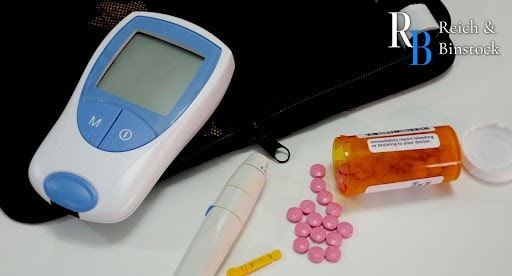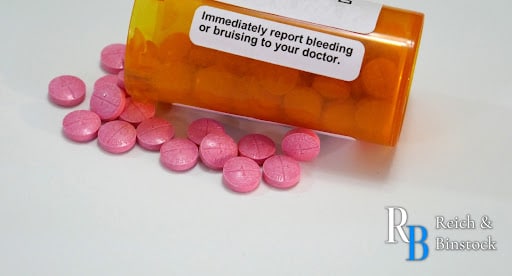XARELTO SIDE EFFECTS
Home > Houston Personal Injury Lawyer > Houston Drug Injury Lawyers > Xarelto Lawsuit > Xarelto Side Effects
MEDICAL DEVICE & PHARMACEUTICAL INJURY
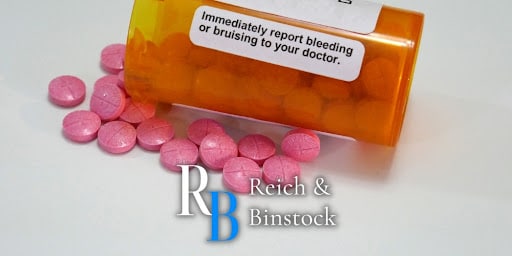
Anticoagulants are drugs that require blood tests and monthly monitoring to optimize dosage. Too much of the drug, and patients could develop a dangerous clot. Too little, and patients could suffer uncontrolled bleeding.
While all anticoagulants carry the risk of excessive bleeding, older drugs like warfarin have antidotes to prevent harm to the patient. Xarelto does not: Bleeding will continue until the drug is flushed out of the patient’s system. By then, the patient may suffer organ failure, stroke, or other devastating complications.
What Is Xarelto?
Xarelto (also called rivaroxaban) is an oral medication that doctors prescribe to prevent blood clots after knee replacement surgery, hip replacement surgery, or when a patient has an irregular heartbeat. It is one of many blood thinners on the market in the United States. Also, it is a brand-name-only product, which means that there is currently no generic version. It has been approved by the Food and Drug Administration (FDA) to both prevent and treat blood clots.
What Is Xarelto Prescribed For?
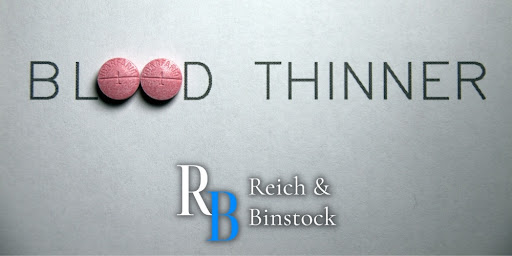
Xarelto has many uses for which a healthcare professional might prescribe it. The most popular conditions it treats are as follows.
- Deep vein thrombosis (DVT)
- Blood clots from atrial fibrillation
- Blood clots after hip replacement or knee replacement surgery, or spinal surgery
- Preventing a blood clot in a high-risk patient after their hospital discharge
- Pulmonary embolism (PE)
- Used in children to prevent blood clots after heart surgery
- Venous thromboembolism (VTE)
- To lower the risk of stroke
- Coronary artery disease
- Peripheral artery disease
Xarelto Marketing Doesn't Show Serious Xarelto Side Effects
When Johnson & Johnson/Janssen Pharmaceuticals introduced Xarelto, it marketed the drug as a medication that did not require blood tests and monitoring. Many patients who were taking warfarin welcomed the convenience of not having to take blood tests. Its slogan is “With XARELTO®, you can say goodbye to warfarin’s blood monitoring routine.”
While the marketing campaign proved successful, helping to sell billions of dollars worth of Xarelto, the decision not to recommend blood testing or monitoring has been seriously questioned. So, what really happened on Xarelto?
Soon after the drug was introduced, patients began reporting complications such as uncontrolled bleeding, internal bleeding (rectal and intestinal), brain hemorrhage, and embolism.
FDA Warns Against Xarelto Side Effects
After reviewing hundreds of reports of patient injury and death, the U.S. Food and Drug Administration acknowledged that while dispensing with monthly monitoring was convenient, patients could have benefited from blood testing at initiation and then yearly to ensure appropriate dosing of the drug.
Unfortunately, the makers of Xarelto chose not to use this information. Johnson & Johnson/Janssen Pharmaceuticals continues to market Xarelto as an anticoagulant that does not require blood testing or monitoring. In doing so, it exposes thousands of patients to the risk of severe injury and death.
Does Xarelto Have a Black Box Warning?
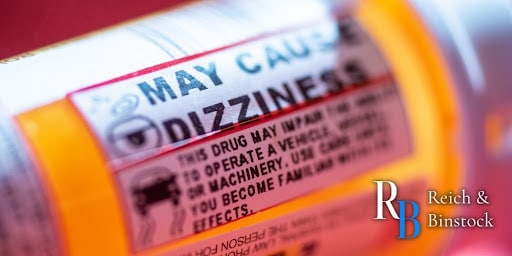
Yes. Xarelto has a black box warning about the risk of blood clots if you stop taking the medication. It also mentions the risk of a spinal blood clot, spinal hematoma, or epidural hematoma. Black box warnings should always be thoroughly read, and patients should adhere strictly to the instructions on how to take their medication. If you miss a dose of Xarelto or stop taking Xarelto, it’s important to call your doctor to ensure that no blood clotting occurs.
What Are the Side Effects of Xarelto?
Some people experience mild side effects from certain prescription drugs, including Xarelto. Below, we list some of the most common adverse reactions.
- Increased risk of bleeding
- Muscle weakness
- Abdominal pain
- Itching
- Back pain
- Dizziness
- Depression
- Anxiety
- Muscle spasms
- Difficulty sleeping
- Vomiting material that looks bloody or like coffee grounds
In most cases, these side effects might only last a few days or weeks. However, if they continue for longer, you should tell your doctor or pharmacist right away.
What Are the Bad Side Effects of Xarelto?
It is also possible to experience more serious side effects as a result of Xarelto use. Although they are uncommon, patients should still be notified of the following risks.
- Severe bleeding
- An allergic reaction
- Spinal or epidural hematomas
- If you stop taking Xarelto, it is possible to form blood clots.
Again, should you experience any side effects from any medication, whether prescription or over-the-counter medicines, call your doctor immediately. Certain side effects, such as severe allergic reactions or major bleeding events, can be fatal. If you need emergency medical help, don’t hesitate to call 911.
Additionally, older adults and seniors may experience slightly different side effects. It is very common for an elderly person to be prescribed a blood thinner medication. However, many of these medications, including Xarelto, have unique potential side effects in the elderly. We list these below.
- Higher risk of severe bleeding or fatal bleeding
- Prolonged bleeding after cuts or gashes
- Dizziness
- Headaches
- Numbness
- Bruising more easily
- Bleeding gums
- Weakness and fatigue
- Back pain
- Nosebleeds
- Bladder or bowel incontinence
How Long Do Xarelto Side Effects Last?
Mild side effects of Xarelto should last no longer than a few days to a couple of weeks. Most people’s side effects subside after around three to five days. However, many people struggle with the symptoms of withdrawal when they stop taking Xarelto. It’s important to work closely with a healthcare professional when you stop taking the medication. Slowly wean yourself off in order to lower the risk of a blood clot.
It could take longer than a week for most withdrawal symptoms to subside once you finally stop taking the medication. Below, we include a brief timeline of how your body might react to the detox.
- 12-24 hours after one missed dose: Headaches, dizziness, fatigue, back pain, nausea, high blood pressure, feeling lightheaded, bruising easily, heart palpitations, and even dry mouth. This is the period during which the risk of blood clots or strokes is highest.
- 1-3 days after your last dose: Your physical side effects will feel the strongest. You may also experience emotional problems, anxiety, depression, difficulty sleeping, trouble concentrating, and suicidal thoughts.
- 3-5 days after your last dose: The side effects begin to slowly wear off during this period.
- 7 days after your last dose: Most people’s symptoms of withdrawal will have fully faded. Some people still experience mild emotional disturbances.

Why Does Xarelto Cause Lower Back Pain?
Unfortunately, back pain if you take Xarelto is often indicative of a deeper problem. It could be a sign of spinal blood clots. However, most people who experience back pain on Xarelto also have the following risk factors present.
- Spinal taps or a spinal puncture
- Having a spinal catheter
- Genetic spinal defects
- A history of spinal surgery
- You take other drugs that could cause a blood clot.
Spinal blood clots can also cause muscle weakness and even numbness in the body. If you experience these symptoms or incontinence after stopping a blood thinner, call your doctor immediately.
Can Xarelto Cause Blood in Urine?
While it is possible for patients to experience bloody urine, this is a rare side effect. Some patients who feel a burning or painful sensation while urinating may also suffer from unusual bleeding in the urine. This is a rare and potentially serious side effect. Tell your doctor immediately if you have painful urination or serious bleeding in the urine.
Does Xarelto Cause Headaches?
It is possible to suffer from headaches while taking Xarelto. Although it’s one of the more common side effects, that doesn’t mean it can’t indicate something serious. Occasional headaches are fairly normal, but frequent headaches should be reported to your doctor or pharmacist.
Does Xarelto Make You Tired?
Those who take Xarelto may experience tiredness or fatigue. According to certain clinical trials, approximately 1.4% of patients taking Xarelto to treat deep vein thrombosis experienced fatigue. It’s important to speak with your doctor about your lack of energy if it persists.
Is Weight Gain a Side Effect of Xarelto?
This is a very unlikely side effect. Various clinical trials have not reported weight gain as a noteworthy side effect of the medication.
Does Xarelto Affect Your Muscles?
It is possible to experience muscle weakness, numbness, or tingling in certain parts of the body while taking Xarelto. Most patients who experience this side effect feel it in their feet or legs. If this problem persists, speak with your healthcare provider right away.
How to Avoid Xarelto Side Effects
Many people are already aware of the potentially serious risks of bleeding problems and blood clots related to Xarelto use. However, there are several ways in which you can minimize your risk of major bleeding events and serious blood clots. The first step is to understand exactly how Xarelto works as an anticoagulant (blood thinner). Xarelto actually blocks certain blood clotting proteins in the blood from forming clots in the blood vessels. Preventing clots ensures that adequate blood flow reaches all parts of the body. However, because of the decreased clotting ability, Xarelto patients are also at a higher bleeding risk.
In the next two sections, we outline how Xarelto may interact with other medications, as well as the warnings associated with the drug.
Xarelto Drug Interactions
Many prescription drugs interact dangerously with each other in the human body. They can also interact negatively with certain dietary and herbal supplements. Avoid taking the following medications while also taking Xarelto.
- Certain other anticoagulant medications and blood thinners
- Aspirin and medications with aspirin
- Nonsteroidal anti-inflammatory drugs (NSAIDs)
- Selective serotonin reuptake inhibitors (SSRIs)
- Serotonin and norepinephrine reuptake inhibitors (SNRIs)
- Certain antibiotics
- Certain antifungal medications
- Some HIV medications
To find out whether or not your other medicines could interact badly with Xarelto, we recommend seeking professional medical advice. This can help you avoid bleeding complications or another medical emergency.
Xarelto Warnings
According to the FDA, rivaroxaban is not a medication that comes with significant risks of abuse or dependence. However, the risk of serious blood clots increases once you stop taking it. Many doctors recommend using a different blood thinner while stopping Xarelto to decrease this risk.
It is possible to take too much Xarelto, although the concentration of the medicine in the blood does not increase past 50 mg. However, if you accidentally take your next dose too early or take too much, there is an antidote that can reverse the effects.
Certain contraindications exist for Xarelto, meaning that those with certain medical conditions should not take the medication. People with the following issues should avoid taking Xarelto.
- Active bleeding events
- Liver disease
- Kidney disease
- Congenital heart disease
- Allergic reaction tendencies
- Those with a heart valve after a heart attack
- Certain autoimmune disorders
- Those with a high risk of abnormal bleeding
- Pregnant or nursing mothers
What Foods Should I Avoid When Taking Xarelto?
Most doctors recommend avoiding grapefruit juice while taking Xarelto. Other foods to avoid include high amounts of Vitamin K-rich foods. Examples of these foods include kale, broccoli, collard greens, and brussel sprouts.
Should I File a Xarelto Lawsuit?

If you have experienced serious bleeding events, blood clots, or other serious side effects from Xarelto, you may have the basis for a Xarelto lawsuit. We recommend that you speak with an experienced defective drug lawyer who can evaluate your case. At Reich & Binstock, we have extensive experience litigating against negligent drug companies and medical device companies. We have the skills and knowledge necessary to fight for your right to full and fair compensation.
Negligent Drug Companies Should Pay
For a drug company, there are few actions more irresponsible than to put profits ahead of patient safety. One of the reasons we have the civil justice system is to hold drug companies accountable when their reckless actions harm patients. The Xarelto injury attorneys at Reich & Binstock are doing just that!
How Can a Xarelto Lawyer Help Me?
Our Xarelto lawyers can help your case in a number of ways, from the very first consultation to the very end of your case. In order to build a strong case, we will do the following.
- Offer a free case evaluation to determine if you have a valid claim
- Assign blame to all responsible parties
- File the lawsuit on your behalf
- Negotiate with the defendants and their insurance companies
- Represent you and your interests throughout your case
- Gather evidence and retain medical experts to support your claim
- Ensure that your legal rights are protected to the fullest extent
Xarelto Injury Lawyers
If you or a loved one has suffered side effects after taking Xarelto or if someone you know has died, call the attorneys at Reich & Binstock at 713-622-7271 or 800-622-7271 toll free, or write to us online. Our law office is in Houston, and our lawyers handle Xarelto side effects cases throughout Texas and the United States. We offer a free and confidential consultation to discuss your case and your rights.
There is never a fee unless we recover on your behalf.
Additionally, clients are not obligated to pay expenses if a recovery is not made.














